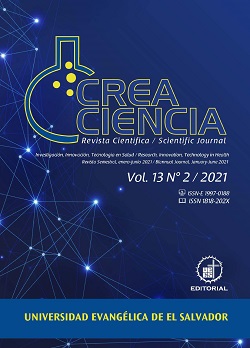Sociodemographic factors and their relationship with the nutritional status of older adults in hospital outpatient visits
DOI:
https://doi.org/10.5377/creaciencia.v13i2.11823Keywords:
Nutritional status, sociodemographic factors, elderly, El SalvadorAbstract
Older adults are an important reality in El Salvador, currently they represent 11.22% of the population and the figure is expected to increase in the coming years. This demographic change, requires nutritional care tools appropriate to the social environment of this population, hence the objective of this research: analyze the relationship of sociodemographic factors and nutritional status of older adults attending the outpatient clinic of the National Hospital Zacamil. Regarding methodology, the study had a quantitative approach and was correlational; the data were subjected to descriptive and inferential statistical analysis using the hypothesis testing technique to draw the conclusions and respond to the objectives set. In this sense, the nutritional state of malnutrition was present in almost 76% of the population. With respect to the relationship of the variables by means of Chi-square, it was determined according to statistical significance that age, sex, area of domicile and socio-economic level have no relation whatsoever. Regarding the level of education and occupation if they maintain a relationship. On the other hand, when estimating the risk of some of the sociodemographic variables, it was established that being younger and having no economic risk is a protective factor of developing malnutrition due to deficit, being a man represents 1.6 times more risk and living in the rural area represents 1.7 times increased risk of developing deficit malnutrition. It is necessary to create nutritional assessment tools that describe socio-demographic variables to guide nutritional care strategies according to each elderly.
Downloads
942
Downloads
Published
How to Cite
Issue
Section
License
© Crea Ciencia
Declaration of originality and assignment of rights
The article must be sent with a declaration of originality, responsibility and assignment of rights of copy of the manuscript, scanned and signed by the author or by one of the authors when the authorship is collective (designated author), stating that the text has not previously published in printed or electronic format, which will not be presented to any other media before knowing the decision of the journal Crea Ciencia and that, if accepted for publication, the authors transfer the copyrights in all forms and media known. At the end of six months of the publication, the text can be shared in another magazine citing the first version of the article published in Crea Ciencia and recording its number and volume. If the article is not published, the UEES agrees to return the rights enunciated to their authors.

Crea Ciencia articles are published in open access and licensed under a Creative Commons Attribution-NonCommercial 4.0 International License.

